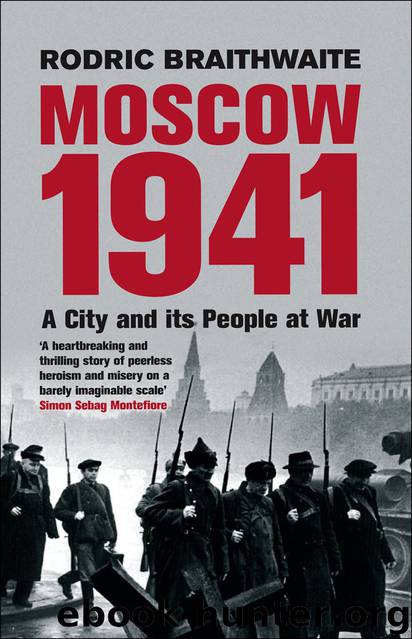Moscow 1941 by Braithwaite Rodric;

Author:Braithwaite, Rodric;
Language: eng
Format: epub
Publisher: Profile Books
Published: 2006-09-23T04:00:00+00:00
– TWELVE –
PANIC
As autumn drew in, the people of Moscow started to get very cold indeed. The mines of the Ukraine and Western Russia were in the hands of the enemy. What little coal reached Moscow went primarily to factories producing for the war. The electricity supply began to break down. The Moscow City Council announced in the press that it was halving the amount of electricity for lighting purposes. In late November, as the Germans approached the Kashira power station South of the city, the local authorities asked for permission to blow it up. Stalin ordered instead that it be defended at all costs and sent General Belov and his Second Cavalry Corps down to help.1
Office buildings were practically unheated. Apartment blocks became uninhabitable as heating failed and bombs blew out the windows. Buildings were closed down – ‘conserved’ – by the local authorities, and the remaining inhabitants were moved into apartments left empty by people who had gone to the front or into evacuation. The original inhabitants were assured that they would get their apartments back when they returned. But the guarantees were not always honoured. Disputes were still going through the courts years later. Yuri Krotkov, a minor literary figure and NKVD informer, did not bother to go to the courts at all when he got back to Moscow in 1943. He simply used his connections with ‘them’, and got his friends in the secret police to evict the squatters.2
As conditions got harder, people experimented with ways of saving electricity, heating their food and finding substitutes for the delicacies they were used to in peacetime. One newspaper told housewives how to make oven boxes lined with straw:
A thermos can be made out of a wooden box with double walls: the gap between should be filled with sawdust, straw, paper, or cotton wool. Soup can be simmered in such a thermos, instead of leaving it on the kerosene stove for a couple of hours. As soon as the soup has boiled, put it in the thermos to simmer, and in two to three hours it will be ready.3
Other advisers suggested ways of prolonging the life of carbon paper and typewriter ribbons. One young scientist devised a substitute for window glass blown out by the bombs. People baked fritters from potato peelings they would previously have thrown away. You put the peelings through the mincer, and added water, flour and salt. Or you grated the peelings, steamed them in water in a frying pan, and added crushed dried birch leaves instead of flour. You could make coffee from acorns. You cut the acorns in two, dried them on the stove, peeled them, boiled them in a saucepan with the lid on, and waited until the water was cold. Then you poured off the water, dried the acorns again, ground them in a coffee grinder, and added chicory or a bit of real coffee to give the taste. A spoonful of acorns was sufficient for one glass of coffee. In their window boxes people grew cucumbers and onions instead of flowers.
Download
This site does not store any files on its server. We only index and link to content provided by other sites. Please contact the content providers to delete copyright contents if any and email us, we'll remove relevant links or contents immediately.
| Africa | Americas |
| Arctic & Antarctica | Asia |
| Australia & Oceania | Europe |
| Middle East | Russia |
| United States | World |
| Ancient Civilizations | Military |
| Historical Study & Educational Resources |
Red Famine: Stalin's War on Ukraine by Anne Applebaum(2817)
Chernobyl by Serhii Plokhy(2440)
Midnight in Chernobyl by Adam Higginbotham(2391)
The House of Government by Slezkine Yuri(2105)
Midnight in Chernobyl: The Untold Story of the World's Greatest Nuclear Disaster by Adam Higginbotham(2079)
Red Shambhala by Andrei Znamenski(2074)
The Gulag Archipelago (Vintage Classics) by Aleksandr Solzhenitsyn(1987)
All the Kremlin's Men by Mikhail Zygar(1962)
From Cold War to Hot Peace by Michael McFaul(1942)
Red Notice by Bill Browder(1933)
Putin's Labyrinth(1903)
The Future Is History by Masha Gessen(1823)
From Russia with Lunch by David Smiedt(1799)
A People's Tragedy by Orlando Figes(1770)
The Romanovs by Simon Sebag Montefiore(1723)
How to Tame a Fox (and Build a Dog): Visionary Scientists and a Siberian Tale of Jump-Started Evolution by Lee Alan Dugatkin & Lyudmila Trut(1682)
Putin's Labyrinth: Spies, Murder, and the Dark Heart of the New Russia(1664)
The Lost Spy by Andrew Meier(1635)
Art and Revolution by John Berger(1608)
